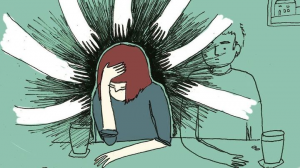Table of Content
OCD is a highly distressing disorder for both the individual and their family. As there is no conclusive cause for OCD, it can be difficult to diagnose and consequently, hard to treat. Read on to find out factors that have been linked to OCD.
With more than 3 decades of experience in treating OCD, we, at Cadabam’s, follow a solution-oriented and clinically-verified treatment approach to build a customised treatment plan that caters to all your needs. We understand that OCD doesn’t affect the individual alone, but affects the family too. Our experts in family therapy, as well as our caregivers, ensure the individual’s complete well-being for holistic recovery. At Cadabams, we care for you.
The media may lead you to believe OCD (Obsessive-Compulsive Disorder) is nothing but washing your hands obsessively. OCD is a highly misunderstood illness as we often dismiss obsessions as quirks or we believe that the person consciously chooses to perform these repetitive actions, maybe even for pleasure, in an attempt to achieve ‘perfection’ In truth, these behaviours can become extremely disruptive to normal functioning.
What is OCD?
OCD or Obsessive-Compulsive Disorder is characterised by the presence of obsessions, which are recurring, unwanted thoughts, ideas or sensations that make a person compelled to perform repetitive actions (mental or physical) called compulsions.
In the early days, OCD was considered an anxiety disorder since 'Anxiety' was a common symptom in many individuals resulting due to obsessive thoughts. To counterfeit the impact of anxiety, they often engage in extensive ritual ceremonies too.
In an OCD related episode, your brain gets stuck around a particular thought and you keep repeating your actions several times. Examples include – checking your fan/geyser/stove multiple times to ensure it’s switched off as you’re afraid to burn down your house or keep washing your hands again and again in the fear of germs.
All these actions make no sense to others but to the sufferers, it seems the only way to minimize the anxiety caused by these obsessive thoughts.
What Causes OCD?
There are multiple reasons for OCD that vary from person to person. Some of the most common causes of OCD are listed below:
- Autoimmune Causes: A rare form of OCD dubbed the “PANDAS” (Pediatric Autoimmune Neuropsychiatric Disorders Association with Streptococcal infections) is often caused due to an infection of the same bacteria that causes strep throat & scarlet cancer. The body’s immune system gets confused and starts attacking basal ganglia (a particular brain area) that results in OCD.
- Behavioural Causes: If you know someone who suffers from OCD, you will notice that they often associate particular objects/circumstances with fear and start avoiding them as much as possible. The fear is closely seen in cases when they’re experiencing intense stress, or have just ended a bad relationship. Avoiding the object seems more feasible to them rather than confronting the fear.
- Imbalance in Brain Structure: Imbalance in the chemical serotonin in the brain may be contributing to the development of OCD. Also, certain chromosome or gene deviation possibly doubles the probability of developing OCD in an individual.
- Family History: The genetic and heredity factor is also one of the obsessive-compulsive disorder causes, where the individual may have inherited the disorder from somebody on the family line. Research and studies carried out among teenagers in India showed that around 30% turned out to have immediate families affected with OCD. Also, children with parents suffering from OCD are prone to having it by around 8% chance. (Source) However, the possibility of OCD being genetically inherited is still not conclusive.
- Negative Reinforcement: Negative reinforcement (a process where something uncomfortable or otherwise unpleasant is taken away when the desired action is performed) can lead to Obsessive-compulsive disorder making compulsive patterns stable. Individuals indulge in compulsive activities because these activities reduce their mental anxieties.
- Environmental Causes of OCD: According to the research, if you or someone in your vicinity have undergone TBI (Traumatic Brain Injury), their chances of suffering from OCD are higher. Even environmental stressors are known to trigger OCD in an individual. These are some of the prominent environmental causes of OCD.
Social factors along with a combination of stressful life events like illness, abuse, death of a loved one, closure to a bad relationship, and other traumatic life events are additional factors that can contribute to the development of OCD. - Keep communications clear and simple: People with OCD will have a habit of constantly seeking reassurance from others over the actions they perform. In cases like this, it is best to keep the exchange of words minimal and to the point to reduce the chance of the OCD triggering.
- Create a supportive environment:
You may notice certain patterns of lifestyle that are clear signs of OCD. Things kept in a certain way, repetition of actions, etc. Instead of trying to stop the routine in an aggressive way, you can tone down the compulsive behaviour by simply agreeing not to be involved in it. This helps battle the condition instead of the person suffering from it.
- Recognise minor improvements:
Recovery is a slow process. As with the case of a person recovering from OCD. it is essential that you encourage positive changes, no matter how trivial they may be. This layer of emotional support can go a long way in the complete recovery cycle. It encourages the individual to continue trying their best.
Treatments for OCD
The treatment for OCD depends on the symptoms you showcase and their severity. However, one of the proven best treatments for OCD is therapy.
Using psychotherapy techniques like CBT (Cognitive Behavioral Therapy), medical practitioners can easily modify your thinking patterns. Using exposure and response prevention, the doctors/therapists can help you minimize OCD effects and stop the repetitive/obsessive thoughts.
Apart from psychotherapy, other treatment options that can help you with the treatment of OCD include - relaxation (includes yoga, meditation, and massage sessions), medication (includes a dosage of psychiatric drugs like citalopram, fluoxetine, etc.), and neuromodulation (includes therapy using devices that change the electrical activity in certain areas of your brain) putting a stop to repetitive thoughts.
After having understood the major factors of what causes OCD, what triggers OCD, and how does OCD develop within an individual, it won’t be wrong to conclude that – causes of OCD vary so greatly that there isn't just one thing that is going to make it go away forever. Nevertheless, with treatment, the condition can be effectively managed so that the patient can live a fulfilling life.
Why Cadabams
At Cadabams, we offer personalised OCD treatment plans catering to all the needs of the individual suffering from OCD and their family members/caregivers. Our multispecialty team of experts is with you every step of the way from diagnosis to post-care. Our evidence-based treatment approach ensures steady recovery and reintegration of patients in society. We are here to help!
To learn more about Obsessive-compulsive disorder treatment, call us @ +91 9741476476.
FAQs About OCD
Can OCD be cured?
OCD is considered a lifelong disorder. Much like other mental health illnesses, there’s no cure for OCD. The treatment measures aim at controlling the symptoms and provide lasting relief to the individual.
Can OCD go away?
Without the needed intervention from a mental health professional, OCD won’t go away. If anything, the condition might get worse. Also, it’s worth noting that, while OCD symptoms may go away with proper treatment, they may return if you don’t stick to your treatment course.
Do I have OCD?
There are different types of OCD. For instance, some people may have fear of dirt, others may need things in a symmetrical way; some people may have aggressive thoughts, others may obsess hoarding any particular thing. If you get repetitive and excessive urges to do certain things,
if you feel the compulsion, you might have OCD. But, of course, self-diagnosis is a no-go. Don’t make any conclusion without first consulting a qualified professional. Visit a mental health expert who specializes in OCD and have them diagnose your condition.
How OCD is treated?
Treatment for OCD varies from one person to another, depending on their type and severity. In general, it includes self-care, medications, and talk therapy. If you have OCD, connect with a professional and have them outline the right course of treatment that best fits your needs and requirements.
OCD should I see a doctor?
Different people have different degrees of OCD. For some, the symptoms may be mild; for others, things could be severe. For those who have mild symptoms, their condition may worsen. In any case, anyone whose “compulsion” or “obsessiveness” for anything is now coming in the way of their work, relationship, and daily life – they must see a doctor.
Disclaimer – We strive to treat our patients with dignity and the utmost sensitivity. We understand that mental health illness is a disease and not a sign of weakness. The term mental health issue is used not in a derogatory fashion but to remain relevant to user search trends and common usage. In case you or a loved one is struggling with OCD or you are caring for one, do share your unique viewpoint on how we can improve this content for our readers, please reach out to us at info@cadabamshospitals.com.
How Cadabam's Help you for Addiction?
- 410+ Professional Consultants
- 1,00,00+ Happy Faces
- 120+ Currently Seeking Treatments












